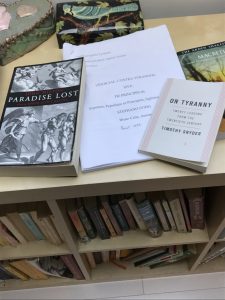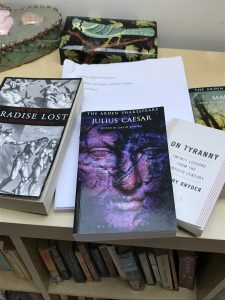This week brings to an end a short and intense online summer grad course on the suddenly topical subject of “Tyranny.” An intrepid band of students joined me to engage with Timothy Snyder’s On Tyranny: Twenty Lessons from the Twentieth Century (2017), Shakespeare’s Macbeth (1606), the pseudonymously published Huguenot resistance tract Vindiciae contra tyrannos (1579), and Milton’s Paradise Lost (1667/1674). We had a lot to say, and our scant five weeks left us little room to shoe-horn in the public debate on Julius Caesar occasioned by the Breitbart-ing of the Public’s production in Central Park.
I’ve distilled my swirling thoughts into five takeaway lessons, or just 25% of Snyder’s longer list. No time for more just now!
My organizing thought, in part responding to a wonderfully restrained production of Macbeth we saw in Rowaytan CT last week, is that literary culture teaches patience, vigilance, and (alas that it is so) guarded pessimism in the long struggle against tyranny. Literature teaches that we cannot always avoid tyranny, but we can resist it and limit it, some of the time.
The fiery slogan sic semper tyrannis, “thus always to tyrants,” which Brutus may or may not have said when stabbing Caesar but which John Wilkes Booth (whose father was named Brutus) wrote in his diary after he shot Abraham Lincoln, has a grim notoriety among American Shakespeareans. Booth and his brothers had played Shakespeare’s Caesar-killing conspirators in a benefit performance in 1864. The funds from that production erected a statue of Shakespeare that still stands in Central Park. The most famous actor among the Booth boys, Edwin, played Brutus; John Wilkes, the year before he killed the President, played Antony, who revenges the play’s assassination. The American legacy of the tyrant-killer’s motto should disturb more than just Shakespeareans: the phrase appears in both innocuous places, such as Maryland’s state song, and horrific ones, such as Timothy McVeigh’s t-shirt when he was arrested following the Oklahoma City bombing in 1995.
What I was looking for in the works we read this summer, and what we found, is something less sudden than regime-change and less history-breaking than impeachment. I found things that resist, affirm, and sustain.
Here are my five lessons:
First Lesson: Read until the end.
I’ve been thinking about endings since Breitbart News suggested that Julius Caesar ends after the title character’s death and should be understood as a pro-regicide play. Everyone who sticks around for the civil war and collapse of the Republic during the next two-and-a-half acts knows better. But I wonder if the point might be generalizable: to understand a historical event requires knowing both its origins and consequences. Did Zhou Enlai really say it was “too early to tell” about the French Revolution in 1972?
One advantage of literary texts is that they can imagine possible endings that aren’t readily available in historical contexts. Endings can be hard to find in history, especially contemporary history, but literary texts all have endings, generic forms, and ideas that emerge from these forms.
To a literary scholar, Timothy Snyder’s twenty maxims against tyranny collectively explore choices of generic form: must Americans today accept conscription into a blood-and-soil history play, or can we #resist in the name of humanistic globalism? Can we write comic unifications rather than violent attempts to divide? Into what genre do we fit our historical present?
The tragic narrative of tyranny, as Snyder observes, dominated European history in the middle of the last century. After 1989, the West in his view entered an extended flirtation with what he calls a “politics of inevitability” (118), in which history ceased to be a struggle and instead became an accretion of technical and incremental progress. Against this thin inevitability, nationalist and authoritarian recrudescences in Europe, the UK, and last fall in the USA advocate a “politics of eternity” (121) that conjures a largely fantasized past. Snyder asks for a renewed sense of history to combat both false views.
But from a literary perspective, the open-ness of “history,” which Snyder defines as “the company of those who have done and suffered more than we have” (125), minimizes the need to imagine an end toward which we are progressing. Literary endings, from the tragedies of Julius Caesar and Macbeth to the more ambivalent “wandering steps and slow” (12.648) which guide Adam and Eve out of Eden, provide models against which to measure the ends of human actions. Snyder’s heroes, both the American Founding Fathers and 20c anti-fascists in Central Europe, followed literary as well as historical lessons. Some, such as Czeslaw Milosz and Vaclav Havel, were themselves major literary figures. Entwining historical observation with literary speculation requires that we imagine literary endings as models for historically-unfolding events — and that we revise those models as facts change. We think with and through real and imagined endings.
Second Lesson: Time and tyrants.
Watching Macbeth in a CT park the other night, I kept re-hearing the characters’ aversions to time. “I feel now,” says freshly unsexed Lady Macbeth to her husband, “The future in the instant” (1.5.57-58). Macbeth wants to “jump the life to come” (1.7.7) and after the murder he returns to his wife’s word for timelessness: “from this instant / There’s nothing serious in mortality” (2.3.93-94). Maybe the couple’s bloody ambition aims to escape time as much as ascend the throne?
Milton’s Satan, too, rebels against temporality when he vaunts to his fellow devils that he bears “A mind not to be chang’d by Place or Time” (1.253). Something there is about tyranny that can’t abide temporal progression?
It’s not enough to say that all tyrants will and must be defeated by and in time, since such a formula elides the need for human solidarity in present struggle. It also falsifies the historical record; lots of tyrants don’t lose. But learning to live contingently in time, with patience and labor, seems to be what tyrants eschew. Living in time as time moves on: it’s tedious, excruciating, necessary.
Third Lesson: “Kings receive laws from the people.”
This maxim comes from the Vindiciae contra tryannos (3.53-54), a #resistance tract published under the pseudonym “Brutus Celta” by French Protestant authors in 1579, possibly in response to the bloody St Bartholomew’s Day massacre of Protestants in Paris in 1572. In a striking inversion of how we think kings (and Presidents) operate, this lesson stresses the monarch’s dependence on the people and their duty to “receive” national laws. Before the Enlightenment theories of democratic politics on which Snyder draws, these sixteenth-century authors find #peoplepower in examples from an eclectic mix of classical, Biblical, and Renaissance sources: from Cyrus the Great to Lycurgus of Sparta; Kings Saul and David of Israel; Romulus and Augustus Caesar; even the sixteenth-century monarchs of France, England, Spain, Poland, Hungary, and other nations.
It’s possible to read the historical and classical record differently, as Machiavelli does in The Prince, drawing on some of the same texts. But it’s striking to see the seeds of #resistance to monarchal power in this pre-democratic text. The people, according to this fictional “Brutus,” are not an unruly mob but the source of national law.
This point seems especially compelling in June 2017 in the context of the US Senate’s secretive and dishonest attempt to legislate an end to publicly supported health insurance for 22 million people whose voices the Republican party is trying very hard not to hear.
Fourth Lesson: “If thou beest he; But O how fall’n!” (1.84)
Paradise Lost provides a fun-house mirror of tyrants, from ambitious Satan to placid God, mansplaining angels, controlling Adam, and curious Eve. Tyranny — if by that term we mean a desire to control more of creation than can be controlled — appears to be a generalized consequence of the Fall. As with other postlapserian qualities, we can glimpse it even in angels and the seat of Heaven. Presumably we see God as a tyrant only because we see with Fallen eyes. But it’s hard to see Him any other way!
Satan’s first words in the epic describe his fellow devil Beelzebub as irremediably changed by their Fall, but his echo of Isaiah 14:11 reflects that fall back onto himself. To Fall and be fall’n (the elision in the word “fallen” fits the pentameter, but surely the poet also intends an audible diminution) means to experience irredeemable loss. Satan faces fall’n-ness without submitting, but the properly human (and, in Snyder’s sense, historical) response must be to accept limitations imposed by the Fall. To borrow a political phrase, we can never be “great again.” All we can do is persist, “hand in hand,” beyond Paradise. #strongertogether
Fifth Lesson Don’t believe in the sameness of “tomorrow and tomorrow and tomorrow.”
Listening once again last week in Rowaytan to Macbeth’s glorious speech that ends up “Signifying nothing” (5.5.22), it struck me that this lyric gorgeousness precisely inverts what Snyder calls a sense of history, which “permits us to be responsible: not for everything, but for something” (125). Macbeth loses all sense of history, responsibility, and human connection after the death of his wife; he’s left only with “th’equivocation of the fiend / That lies like truth” (5.5.42-43).
The anti-tyrannical lesson of Macbeth and perhaps of all these texts requires historical and imaginative discipline to eschew the “walking shadow” (5.5.23) and believe better things are possible, even today.
Anti-tyrannist authors including Shakespeare imagine that non-tyrannical destinies are possible, even when the historical record suggests, as Snyder reminds us, that the “history of modern democracy is also one of decline and fall” (10).
Thanks to my students for a stimulating summer of anti-tyrannical texts!
Further dilations on this tyrannous theme will follow at panels I’m chairing at MLA (New York City, January 2018) and RSA (New Orleans, April 2018).


Leave a Reply